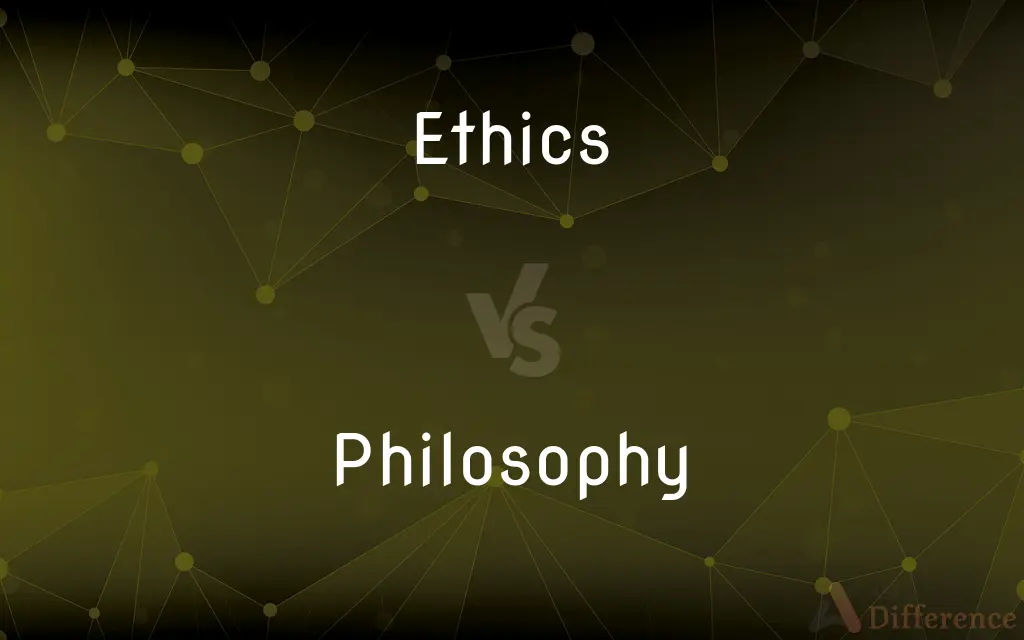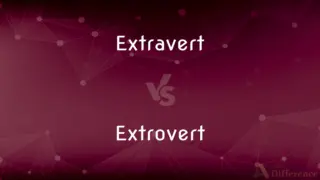Ethics vs. Philosophy — What's the Difference?

Difference Between Ethics and Philosophy
ADVERTISEMENT
Compare with Definitions
Ethics
Ethics or moral philosophy is a branch of philosophy that "involves systematizing, defending, and recommending concepts of right and wrong behavior". The field of ethics, along with aesthetics, concerns matters of value; these fields comprise the branch of philosophy called axiology.Ethics seeks to resolve questions of human morality by defining concepts such as good and evil, right and wrong, virtue and vice, justice and crime.
Philosophy
Philosophy (from Greek: φιλοσοφία, philosophia, 'love of wisdom') is the study of general and fundamental questions, such as those about existence, reason, knowledge, values, mind, and language. Such questions are often posed as problems to be studied or resolved.
Ethics
Moral principles that govern a person's behaviour or the conducting of an activity
A code of ethics
Medical ethics also enter into the question
Philosophy
The study of the fundamental nature of knowledge, reality, and existence, especially when considered as an academic discipline.
Ethics
The branch of knowledge that deals with moral principles
Neither metaphysics nor ethics is the home of religion
ADVERTISEMENT
Philosophy
A theory or attitude that acts as a guiding principle for behaviour
Don't expect anything and you won't be disappointed, that's my philosophy
Ethics
A set of principles of right conduct.
Philosophy
The study of the nature, causes, or principles of reality, knowledge, or values, based on logical reasoning.
Ethics
A theory or a system of moral values
"An ethic of service is at war with a craving for gain" (Gregg Easterbrook).
Philosophy
A system of thought based on or involving such study
The philosophy of Hume.
Ethics
Ethics (used with a sing. verb) The study of the general nature of morals and of the specific moral choices to be made by a person; moral philosophy.
Philosophy
The study of the theoretical underpinnings of a particular field or discipline
The philosophy of history.
Ethics
Ethics (used with a sing. or pl. verb) The rules or standards governing the conduct of a person or the members of a profession
Medical ethics.
Philosophy
An underlying theory or set of ideas relating to a particular field of activity or to life as a whole
An original philosophy of advertising.
An unusual philosophy of life.
Ethics
(philosophy) The study of principles relating to right and wrong conduct.
Philosophy
The love of wisdom.
Ethics
Morality.
Philosophy
(uncountable) An academic discipline that seeks truth through reasoning rather than empiricism.
Philosophy is often divided into five major branches: logic, metaphysics, epistemology, ethics and aesthetics.
Ethics
The standards that govern the conduct of a person, especially a member of a profession.
Philosophy
(countable) A comprehensive system of belief.
Ethics
The science of human duty; the body of rules of duty drawn from this science; a particular system of principles and rules concerting duty, whether true or false; rules of practice in respect to a single class of human actions; as, political or social ethics; medical ethics.
The completeness and consistency of its morality is the peculiar praise of the ethics which the Bible has taught.
Philosophy
(countable) A view or outlook regarding fundamental principles underlying some domain.
A philosophy of government;
A philosophy of education
Ethics
Motivation based on ideas of right and wrong
Philosophy
(countable) A general principle (usually moral).
Ethics
The philosophical study of moral values and rules
Philosophy
(archaic) A broader branch of (non-applied) science.
Philosophy
A calm and thoughtful demeanor; calmness of temper.
Philosophy
Synonym of small pica.
Philosophy
To philosophize.
Philosophy
Literally, the love of, inducing the search after, wisdom; in actual usage, the knowledge of phenomena as explained by, and resolved into, causes and reasons, powers and laws.
Philosophy
A particular philosophical system or theory; the hypothesis by which particular phenomena are explained.
[Books] of Aristotle and his philosophie.
We shall in vain interpret their words by the notions of our philosophy and the doctrines in our school.
Philosophy
Practical wisdom; calmness of temper and judgment; equanimity; fortitude; stoicism; as, to meet misfortune with philosophy.
Then had he spent all his philosophy.
Philosophy
Reasoning; argumentation.
Of good and evil much they argued then, . . . Vain wisdom all, and false philosophy.
Philosophy
The course of sciences read in the schools.
Philosophy
A treatise on philosophy.
Philosophy
A belief (or system of beliefs) accepted as authoritative by some group or school
Philosophy
The rational investigation of questions about existence and knowledge and ethics
Philosophy
Any personal belief about how to live or how to deal with a situation;
Self-indulgence was his only philosophy
My father's philosophy of child-rearing was to let mother do it
Share Your Discovery

Previous Comparison
Extravert vs. Extrovert
Next Comparison
Facebook vs. Netlog













































